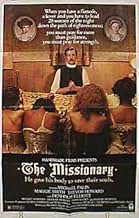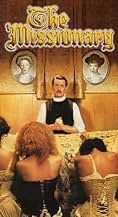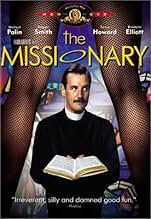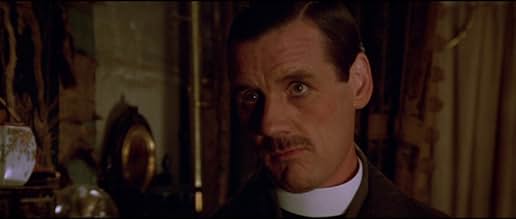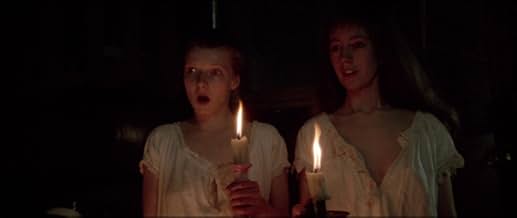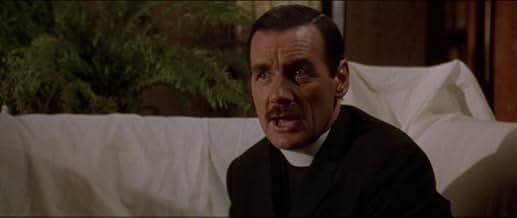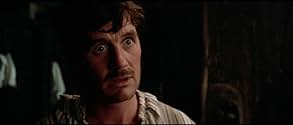AVALIAÇÃO DA IMDb
6,2/10
2,9 mil
SUA AVALIAÇÃO
Adicionar um enredo no seu idiomaIn the early 20th century, devout Reverend Charles Fortescue returns to England from his missionary work in Africa and, despite plans to marry his childhood sweetheart, receives a most unusu... Ler tudoIn the early 20th century, devout Reverend Charles Fortescue returns to England from his missionary work in Africa and, despite plans to marry his childhood sweetheart, receives a most unusual assignment: minister to the local prostitutes.In the early 20th century, devout Reverend Charles Fortescue returns to England from his missionary work in Africa and, despite plans to marry his childhood sweetheart, receives a most unusual assignment: minister to the local prostitutes.
Debby Bishop
- Mission Girl
- (as Debbie Bishop)
Avaliações em destaque
I really like this film. It's just one of those films that bring a smile to your face. There are some fantastic moments: Roland Culver dying while Michael Palin obliviously continues with his speech, Michael Hordern as the butler who doesn't know where he's going, Michael Palin being propositioned by a lady of the night (and accepting). It's just a very charming film.
One thing that did strike me about it though is how we find situations acceptable if they are transported into the past. I don't think it would be considered very funny to make a film in which a Reverend lets three child prostitutes into his bed at once if it was set in today's London. We can laugh about the hypocritical sexual shenanigans of the Victorians though. Paedophilia's funny as long as it's in the distant past.
One thing that did strike me about it though is how we find situations acceptable if they are transported into the past. I don't think it would be considered very funny to make a film in which a Reverend lets three child prostitutes into his bed at once if it was set in today's London. We can laugh about the hypocritical sexual shenanigans of the Victorians though. Paedophilia's funny as long as it's in the distant past.
It's 1906. Reverend Charles Fortescue (Michael Palin) returns to England after 10 years as a missionary in Africa. He is to be married to the naive Deborah Fitzbanks. The Bishop (Denholm Elliott) assigns him to proselytize to the prostitutes of London's Dockland and stop them. Deborah eagerly helps him organize even thought she's ignorant of the ladies of the night. Charles needs to raise the funds and the flirtatious Lady Isabel Ames (Maggie Smith) offers to help. She's married to the callous Lord Henry Ames (Trevor Howard).
This is a terrific English comedy. The sly humor is effective. It's funny that Palin is the boy toy and Maggie Smith is the cougar. The jokes take a bit longer to tell like the butler who keeps getting lost. It's a little slow at times but there is good hilarity.
This is a terrific English comedy. The sly humor is effective. It's funny that Palin is the boy toy and Maggie Smith is the cougar. The jokes take a bit longer to tell like the butler who keeps getting lost. It's a little slow at times but there is good hilarity.
In England in 1906, a young reverend, with a sense of vocation and just before marriage, is entrusted to open a house of refuge for fallen ladies of East End. He is then seduced by the grateful girls and a witty, love-seeking lady nob, who is ready to support the institute.
A fitfully amusing, crisply acted, often sophisticated period comedy whose central conception - prostitutes do what they do for pleasure - is slightly absurd to say the least. Most of its fun is provided by the garnish.
A fitfully amusing, crisply acted, often sophisticated period comedy whose central conception - prostitutes do what they do for pleasure - is slightly absurd to say the least. Most of its fun is provided by the garnish.
This is a delightful film. Watch it with two or three of you in the room, because laughter is infectious. As ever with films that Harrison invests in, it's not afraid to mix styles, but also, there is no point that it labours. Too often films are afraid of changing their tone, as if they had to nail their colours to the 'tonal' mast early on and then obey that: a screwball comedy has to be screwball, a period piece has to be charming, engaging, but not dramatic, etc etc etc.
The script, written by Palin himself, is an absolute gem, and for once his silliness is kept well within bounds. As someone else said, this isn't the 'expansio ad absurdum' technique of fine, fine Python, nor the pull-faces-and-use-silly-words-can't-think-of-an-idea of Palin on his off days. Enough, but not enough, has been written about the cast, all of whom provide top-notch performances. Whom to praise most? I note as well, that the "Memorable Quotes" section still misses what may be the funniest exchange in the whole film, the sequence which begins, "You know perfectly well why we got rid of Margetson." The only people who are going to be disappointed by this film are those people who have dogmatic views about what a Palin film should be, or who think a comedy should spare them the trouble of thinking and leave them in a heap of rubble on the floor. Take the film on its own merits and, though you might think of ideas which the film didn't touch, places where it didn't go, you will still find enough in there to remember those ninety minutes fondly. Would I see it again? When's it on next?
The script, written by Palin himself, is an absolute gem, and for once his silliness is kept well within bounds. As someone else said, this isn't the 'expansio ad absurdum' technique of fine, fine Python, nor the pull-faces-and-use-silly-words-can't-think-of-an-idea of Palin on his off days. Enough, but not enough, has been written about the cast, all of whom provide top-notch performances. Whom to praise most? I note as well, that the "Memorable Quotes" section still misses what may be the funniest exchange in the whole film, the sequence which begins, "You know perfectly well why we got rid of Margetson." The only people who are going to be disappointed by this film are those people who have dogmatic views about what a Palin film should be, or who think a comedy should spare them the trouble of thinking and leave them in a heap of rubble on the floor. Take the film on its own merits and, though you might think of ideas which the film didn't touch, places where it didn't go, you will still find enough in there to remember those ninety minutes fondly. Would I see it again? When's it on next?
I've recently finished reading Michael Palin's second set of diaries ("Halfway to Hollywood"), which includes sections covering the real-time writing and filming of this particular film and so was pleased to get the chance to view it.
It's a pleasantly diverting comedy taking gentle pot-shots at snobbery, the English class system, the church and as the title makes clear, the Edwardian outlook on sex, peopled by a top-drawer British cast in very good form.
Palin himself takes the lead part and if lacking a little in the masculine virility I think the part calls for, nonetheless masters as you'd expect the comic delivery for which he's well regarded. To be fair, he is definitely outshone by his co-lead, Maggie Smith, as the repressed wife of a titled benefactor, late of the street herself as Smith herself relates to us in a disarming Cockney accent near the end. Michael Hordern does a hilarious little cameo as a befuddled butler, likewise Denholm Elliott as a "sporty" bishop and Trevor Howard as the frightfully frightfully titled patron-husband of Smith. I also liked Phoebe Nicholl's little turn as Palin's dim and virginal intended bride with a penchant for cataloguing. Some of the characters do, however, seem like leftovers from Palin's wonderful "Ripping Yarns" series and occasionally the film does veer off the track a little too much into farce territory with the ending tapering off somewhat, but with Palin the writer often employing the familiar trick of finishing scenes with amusing jokes, he just about keeps the film on an even keel for its not overlong playing time.
As for the direction, I did find the lighting a little gloomy at times and I suppose lack of budget could have been slightly to blame for not quite delivering a convincing depiction of the squalid streets of London where Palin looks to lift up his fallen women (in the Gladstonian sense of the phrase, naturally).
On the whole though, a likable, at times highly amusing light comedy rather making me sad a little that Michael later got lost on his worldly travels (entertaining as they've been), at the expense of his writing and acting skills.
It's a pleasantly diverting comedy taking gentle pot-shots at snobbery, the English class system, the church and as the title makes clear, the Edwardian outlook on sex, peopled by a top-drawer British cast in very good form.
Palin himself takes the lead part and if lacking a little in the masculine virility I think the part calls for, nonetheless masters as you'd expect the comic delivery for which he's well regarded. To be fair, he is definitely outshone by his co-lead, Maggie Smith, as the repressed wife of a titled benefactor, late of the street herself as Smith herself relates to us in a disarming Cockney accent near the end. Michael Hordern does a hilarious little cameo as a befuddled butler, likewise Denholm Elliott as a "sporty" bishop and Trevor Howard as the frightfully frightfully titled patron-husband of Smith. I also liked Phoebe Nicholl's little turn as Palin's dim and virginal intended bride with a penchant for cataloguing. Some of the characters do, however, seem like leftovers from Palin's wonderful "Ripping Yarns" series and occasionally the film does veer off the track a little too much into farce territory with the ending tapering off somewhat, but with Palin the writer often employing the familiar trick of finishing scenes with amusing jokes, he just about keeps the film on an even keel for its not overlong playing time.
As for the direction, I did find the lighting a little gloomy at times and I suppose lack of budget could have been slightly to blame for not quite delivering a convincing depiction of the squalid streets of London where Palin looks to lift up his fallen women (in the Gladstonian sense of the phrase, naturally).
On the whole though, a likable, at times highly amusing light comedy rather making me sad a little that Michael later got lost on his worldly travels (entertaining as they've been), at the expense of his writing and acting skills.
Você sabia?
- CuriosidadesActor, Writer, and Producer Sir Michael Palin and Director Richard Loncraine said that they didn't succeed in achieving everything they wanted to with this movie, but though not perfect, it turned out very well nonetheless.
- Erros de gravaçãoDeborah describes the Ames family home as being on the Great Western line out of London. Fortescue is later misidentified as the dog clipper from Faversham, which is on the other side of London, on the north coast of Kent. (This town being on the South Eastern and Chatham Railway, not the Great Western). It seems highly unlikely that the family would employ a dog clipper from so far afield.
- Cenas durante ou pós-créditosPay close attention to the photo album during the end credits, the photos reveal details about the characters after the events of the film.
- ConexõesFeatured in Live from the Lighthouse (1998)
Principais escolhas
Faça login para avaliar e ver a lista de recomendações personalizadas
- How long is The Missionary?Fornecido pela Alexa
Detalhes
- Data de lançamento
- País de origem
- Central de atendimento oficial
- Idioma
- Também conhecido como
- The Missionary
- Locações de filme
- Empresa de produção
- Consulte mais créditos da empresa na IMDbPro
Bilheteria
- Faturamento bruto nos EUA e Canadá
- US$ 7.241.180
- Fim de semana de estreia nos EUA e Canadá
- US$ 1.864.852
- 7 de nov. de 1982
- Faturamento bruto mundial
- US$ 7.241.180
Contribua para esta página
Sugerir uma alteração ou adicionar conteúdo ausente


